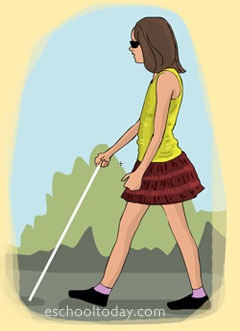 |
What are the types of disabilities?
Disability comes in many ways, and in varying severity. Some people have disabilities from birth; others have disabilities as a result of some events in the course of their lives, while others have it just by old age. Let us see these three broad areas of disability: Mental, Physical and Learning Difficulty.
 Mental Disability Mental Disability
This kind often develops before the age of 18. It could be intellectual or psychiatric in nature.
Intellectual disability relates to the person's thought processes, communication, memory, learning, problem solving and judgment. Experts use the IQ test to tell if a person has an intellectual and developmental disability (formaly called mentally retarded). An example of developmental disability is autism.
Psychiatric disability relates to the person's social abilities such as behavior, emotions, and thinking. Examples include autism and childhood psychosis.
  Physical Disability Physical Disability
This type may either be a motor deficiency (mobility impairment) or a sensory impairment.
Motor deficiency is related to the spinal cord, causing paralysis to some or all of a person’s limbs (hands and legs). It may also be related to the brain damage, which may occur before birth, during or after birth or after a stroke. An example is cerebral palsy.
Sensory impairment is related to a person's sight or hearing. The correct term for this is Visually impaired or Hearing Impaired.
 Learning Disability Learning Disability
This is a neurological disorder that makes it difficult for a person to store, process and produce information. It is not a mental disability. It can affect a person’s ability to read, compute, speak and write. This type is termed ‘Invisible Disability’ because unlike the others, you may not be able to tell be just looking at the person. People with a learning disability may exhibit signs like
(a) Hyperactivity: A person who finds it difficult to stay at one play, or do one thing at a time, or has a very short attention span.
(b) Memory disorder: A person who has auditory problems or has difficulty remembering something that they heard, said or saw a brief moment ago.
(c) Over-attention: A person who can stare or stay focused on something for a long time even if there is a significant distraction.
(d) Dyslexia: A person who has difficulty reading, writing, speaking or spelling.
 
|
 |
